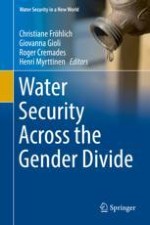2018 | OriginalPaper | Buchkapitel
7. Engaging with Gender in Water Governance and Practice in Kenya
verfasst von : Chinwe Ifejika Speranza, Edward Bikketi
Erschienen in: Water Security Across the Gender Divide
Aktivieren Sie unsere intelligente Suche, um passende Fachinhalte oder Patente zu finden.
Wählen Sie Textabschnitte aus um mit Künstlicher Intelligenz passenden Patente zu finden. powered by
Markieren Sie Textabschnitte, um KI-gestützt weitere passende Inhalte zu finden. powered by
